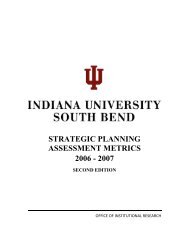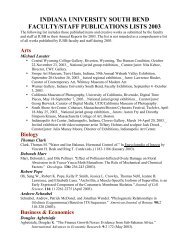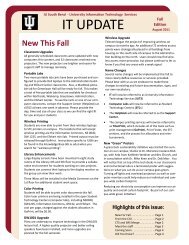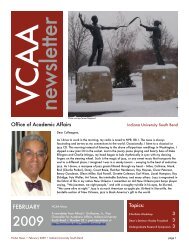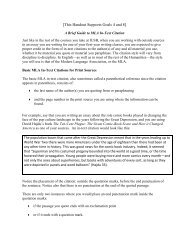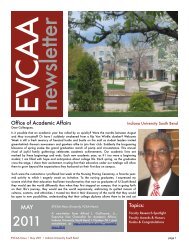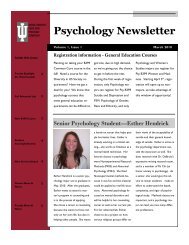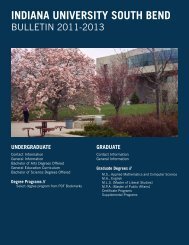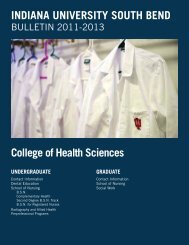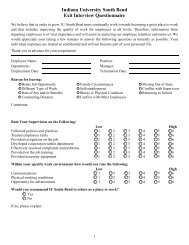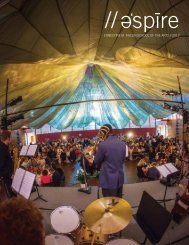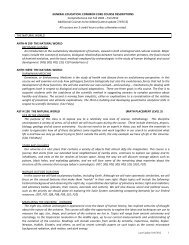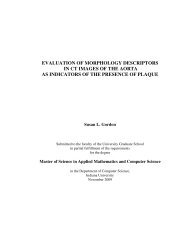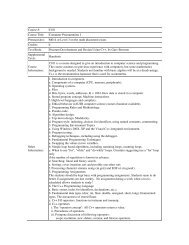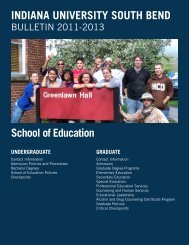Current version - Indiana University South Bend
Current version - Indiana University South Bend
Current version - Indiana University South Bend
Create successful ePaper yourself
Turn your PDF publications into a flip-book with our unique Google optimized e-Paper software.
ERNESTINE M. RACLIN SCHOOL OF THE ARTS4GRADUATE DEGREES 4221<br />
Final Writing Project<br />
The student must complete a final writing project prior<br />
to the graduate recital. This project may take one of<br />
three forms: a thesis, extended program notes, or a<br />
performance-lecture. Each is explained in detail below.<br />
Students must present a proposal for their project by<br />
October 1 for completion in the spring semester and by<br />
March 1 for completion in the fall semester. Proposals<br />
should include the student’s name, degree program, a<br />
working title for the project, a 1-2 page single-spaced<br />
narrative providing background and significance of the<br />
project, and the semester in which the project will be<br />
completed.<br />
Master’s Thesis<br />
The master’s thesis is an extended research paper on<br />
a subject in music history or music theory chosen in<br />
consultation with and under the direction of a member<br />
of the academic faculty. The thesis must present an<br />
original idea and argument that is supported by extensive<br />
research in a document generally 50-75 pages in length.<br />
Extended Program Notes<br />
With this option, the student will prepare extended,<br />
comprehensive program notes that address the repertoire<br />
chosen for the student’s graduate recital. The notes must<br />
be based on substantive research in order to provide<br />
contextualization and analysis for each piece on the<br />
program. This project has two parts: extended program<br />
notes for review by the advisor (approximately 15 pages)<br />
and condensed program notes for printing in the recital<br />
program (approximately 5 pages).<br />
Lecture-Recital<br />
The student will prepare a 45-60 minute performance<br />
lecture that will be given immediately before the recital<br />
program. During the lecture, the student should provide<br />
the audience with historical contextualization and<br />
analysis of the pieces to be performed and demonstrate<br />
musical examples where appropriate.<br />
Graduate Qualifying Examinations<br />
Students must pass final examinations in music history,<br />
theory, and major area before the graduate recital. A<br />
student may attempt the examinations at any time during<br />
the degree program but must successfully complete<br />
each segment within a maximum of two attempts or be<br />
dismissed from the program.<br />
• Each oral examination will be about 50 minutes.<br />
• There will be a committee of three faculty members<br />
—including the studio teacher—and at least one<br />
academic faculty member.<br />
• Two questions will be asked four weeks prior to the<br />
oral examination. One question will relate specifically<br />
to the area of study, and one question will relate to the<br />
final writing project, with a focus on music history and<br />
music theory. The student will prepare a 15 minute<br />
answer for each question, with additional time allotted<br />
for follow-up.<br />
Sample question:<br />
Composers often engage with political and social issues<br />
through their music. Choose two pieces, one choral and<br />
one symphonic, by two different American composers<br />
and compare and contrast the ways in which each<br />
addresses a specific contemporary problem. Be prepared<br />
to discuss and cite relevant scholarly literature.<br />
The Diploma Programs<br />
The Performer Diploma<br />
The Performer Diploma Program is a special curriculum for<br />
outstanding students in performance who show promise of<br />
becoming concert artists and who do not wish to pursue<br />
study leading to an academic degree. The purpose of the<br />
program is to provide concentrated study in solo and<br />
chamber music literature.<br />
Prerequisites<br />
• A high school diploma or its demonstrated equivalent<br />
• Demonstrated proficiency in musical performance at<br />
a very high level of technical and musical proficiency<br />
Admission<br />
On the basis of auditions and dossier, applicants must be<br />
accepted by the appropriate faculty committee and the<br />
studio teacher.<br />
Language Study<br />
Students whose native language is not English must<br />
take an English language examination at IU <strong>South</strong><br />
<strong>Bend</strong>. Depending on the level achieved, they may need<br />
to register for any deficiency courses prescribed by the<br />
advisor.<br />
Curriculum<br />
Applied Music<br />
• Four semesters of studio study; a minimum of 12<br />
credit hours must be earned<br />
• Two recitals (2 cr.) or equivalent public performances<br />
as assigned by the music faculty must be presented<br />
and passed<br />
• Two semesters of MUS-X 423 Chamber Music (1 cr.<br />
each) required for instrumentalists only<br />
Electives (6 cr.)<br />
Graduate or undergraduate courses, as approved by<br />
the advisor. Classes in music literature, history, and/<br />
or pedagogy are recommended, though others may<br />
be possible with permission from the advisor. Studio<br />
courses or chamber music study may not be used to<br />
fulfill this requirement.



